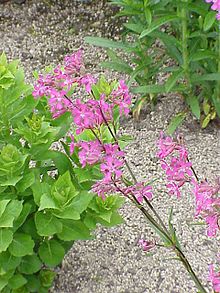Lychnis viscaria
| Silene viscaria | |
|---|---|
 |
|
| Scientific classification | |
| Kingdom: | Plantae |
| (unranked): | Angiosperms |
| (unranked): | Eudicots |
| (unranked): | Core eudicots |
| Order: | Caryophyllales |
| Family: | Caryophyllaceae |
| Genus: | Silene |
| Species: | S. viscaria |
| Binomial name | |
|
Silene viscaria (L.) Jess. 1879 |
|
| Synonyms | |
|
Lychnis viscaria L. 1753 |
|
Lychnis viscaria L. 1753
Silene viscaria, the sticky catchfly or clammy campion, is a flowering plant in the family Caryophyllaceae.
It is an upright perennial growing to 60 cm (24 in) in height. The leaves are lanceolate. The flowers, which are 20mm across and bright rosy-pink, appear in long whorled spikes from May to August. It grows on cliffs and rocky places.
The Latin specific epithet viscaria means “sticky”, and refers to the stickiness of the stem just below the leaf joints. The English common names reference the same feature.
S. viscaria is also grown as an ornamental garden plant. In British horticultural literature it is often referred to by its synonym Lychnis viscaria. The cultivar ‘Splendens Plena’, a double-flowered form, has won the Royal Horticultural Society’s Award of Garden Merit.
Lychnis viscaria is said to increase the disease resistance of surrounding plants. Extract from L. viscaria contains a relatively high amount of brassinosteroids, which have a proven positive effect on the growth of other plants. In Germany the extract is allowed for use as a "plant strengthening substance".
Seed, background lines are 5 mm (0.20 in) apart
Whorl of seed capsules, background lines are 5mm apart
Seed capsule, viewed from side
Seed capsule, viewed end on
...
Wikipedia
